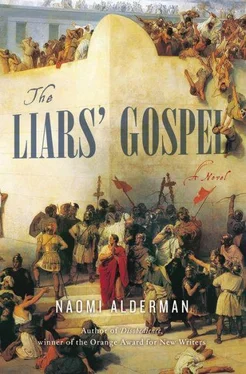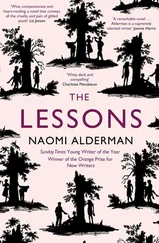There were things the man said that filled Iehuda with fire, as if his blood had turned to flame.
There was a beggar among the group, and when the rest of them opened up their packs and ate their barley cakes and olives or dried fish, he had no food to eat. They each gave him a little of their own to make up a meal and he ate ravenously, gratefully.
Yehoshuah sifted the dirt under his hands and said, “Why do we give charity?”
Iehuda replied quickly, “It’s written in the Torah: ‘When your brother becomes poor, extend your hand to him, and strengthen him — even the convert and the settler.’ God commanded it.”
Yehoshuah nodded slowly. “Now answer me this. Why is it written in the Torah? Why did God command it?”
Iehuda blinked. This is not a question a man can hope to answer. To ask, “Why did God do so?” is as much as to say, “I can understand the infinite mind of God.”
“For our highest good,” piped up one of the others. “All God’s commandments are for our good.”
“But why?” pressed Yehoshuah. “Why is it good for us? Why did God lay this down for us?”
There was silence around the fire. The three men who had arrived with Yehoshuah must already know the answer, or the special point he was making. The others were dumb, afraid that they would give the wrong response. Iehuda, suddenly tired of the game and of this man trying to make them feel stupid, replied.
“It’s not given to us to know why God does anything,” he said. “Our job is to listen to His commands and obey them.”
The other men nodded. This is what it means to be a pious Jew: to learn the law and to obey it.
“Like the soldiers of Caesar?” said Yehoshuah, a smile on his lips. “Like a man bought for hire? To do without knowing the reason for what you do? Our God is not a tyrant. He would not have given us sharp minds if we were not meant to use them. Think. Why did God tell us to give charity?”
At this, two of the men quietly began to pack up their things to go. Yehoshuah did not try to detain them. He had compared their belief to the blind obedience of the soldiers; he must have known this would be intolerable to some.
Iehuda felt his mind stretch after the question, though. It was a good question. If he had to make a guess at the reasoning of God — and even the thought was faintly sickening, like looking down a long drop — if he had to guess, he might say…
“Perhaps God has commanded us to help the poor because He loves them.”
Yehoshuah clapped him on the back: “This is a good answer, my friend! See, we have been reasoning for but a few moments and already we have puzzled out who God loves! And from His commandments, who else does He love?”
“The blind and the crippled…” Iehuda began, thinking of the commandment not to put a stumbling block before the blind. “The widow and the orphan? For it says in the Torah, ‘Do not mistreat widows and orphans. If you mistreat them, I will hear their cries.’”
“Yes,” said Yehoshuah, “God has a special love for women without husbands, sons without fathers. Think more. Why does God say, ‘Love your neighbor’?”
Iehuda had it now. “Because God loves…” He paused. “He loves those who are near to us?”
“Has he not taught us all to love our neighbors? Is not every person the near neighbor of some other person? Even soldiers, are they not—”
“No,” said Iehuda, extremely irritated, “soldiers are not neighbors. If you go on this way you will have us sharing our food with the men who come to burn our crops and marrying our daughters to the men who raped our wives.” He paused.
Yehoshuah looked at him, interested.
Encouraged, Iehuda went on, “You cannot know what God had in mind for us. He told us to love our neighbors, that is enough. If we start adding to the law where will we be? Like the Romans, making little gods to tell us everything we want to do is right.”
“How if I say this?” said Yehoshuah. “The Torah says, ‘Love your neighbor.’ But since everyone is someone’s neighbor, I say, ‘Love your enemy.’”
“That’s nonsense. We could love them, but it would not make them love us.”
“But imagine if everyone did so. Imagine if we spread that word. Love your enemy. From village to village and town to town. What would happen? Imagine it.”
Trying to grasp it made Iehuda’s mind stutter.
“I cannot imagine,” he said at last. And then, because he yearned to understand, “Explain it to me, teacher.”
Yehoshuah put his rough palm on the back of Iehuda’s hand.
“If the world were filled with people who listened to these few words, only these words, we would build the kingdom of heaven on earth. That is why I travel from village to village. That is the work of my life. To teach people to look into the words of God until they see the heart of everything. Imagine it: the Romans and the Greeks and the Syrians and the Babylonians and the Persians, imagine if we all learned, together, to love one another.”
Iehuda allowed his mind to follow, across the map of the wide world, across the empires and kingdoms that fought and tried to rule and subdue each other. And he imagined what might happen if these words traveled from mouth to mouth, from mind to mind, from one city to the next to the next, if this simple message — love your enemy — were the accepted creed of all the world. He did not see how it could happen.
“If one man went against it,” he said at last, “the whole thing would be broken. In a world like that, a world of peace, a world of soft people with no knives, one man could destroy everything.”
“Then we cannot rest until every man has heard it. Think,” said Yehoshuah softly, “what shall we use up our lives for? More war, like our fathers and their fathers, more of that? Or shall we use ourselves for a better purpose? Is this not worth your life?”
And Iehuda saw it, just for a moment. In this instant, the whole world was new to him.
He could not stop thinking after that. His mind was rattling like a cart on a rock-strewn road, picking up speed, heading downhill helter-skelter, jerking and bouncing. He wondered if he were going mad.
When the other men went home, past midnight, he stayed and talked with Yehoshuah, asking each question as it came to him, sometimes sitting silently for a long time.
“What about people who come to harm you? What shall we do if they try to hurt us?”
Yehoshuah stretched out his long body on the bedding roll over the stones. He put his hands behind his head, leaned back and looked at the dark, coruscant sky.
“What do you think, Iehuda,” he said, “what does your heart tell you?”
Yehoshuah had folded one leg over another. His simple brown traveling robe was stained with dust and sweat. The skin of his face and arms and legs was sun-worn and weathered. He was still so young, though. How had he come to know so much?
“I am trying…” he said, and came to a halt. He tried to think afresh, to imagine a world entirely new, with no certainties, but he could not make himself bend. “If we must love our enemies, and our enemy is the empire of Rome, would we not have to become their slaves?”
Again and again, all he could come back to was the single alternative he knew.
“Would we be like the priests in the Temple,” he said at last, knowing it was a kind of capitulation, angry with himself for not being able to think further, “bowing and scraping to Rome? Trying to please them?”
Yehoshuah sat up a little. “Come and lie by me,” he said.
He shifted position to make room for Iehuda.
Iehuda came and lay beside him.
“Look up at the heavens,” said Yehoshuah, “look at the stars.”
Iehuda looked. The sky was crammed with stars as a pomegranate is filled with honey-sweet seeds.
Читать дальше












